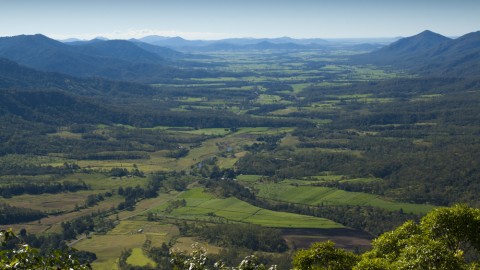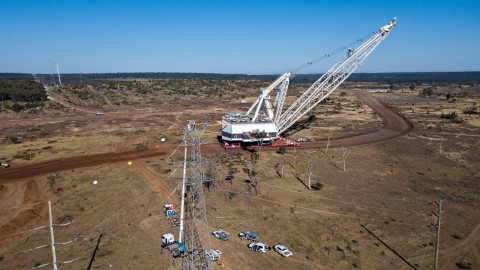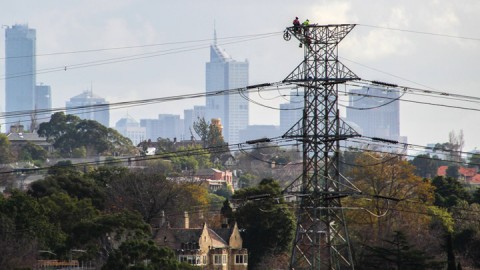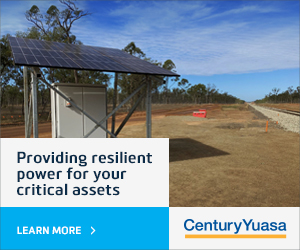Technology Innovation Engineer, Ergon Energy
In this edition, our regular profile of women working in utilities sees us talking to Jenny Gannon, a Technology Innovation Engineer at Queensland’s Ergon Energy. Jenny’s role currently sees her managing the Guided Innovation Alliance Adaptive LED Streetlight Trial.

Jenny Gannon.
Jenny’s career at Ergon Energy began with vacation engineering work in Toowoomba in 2003. In 2004 she moved to Townsville and in 2005 to Cairns as part of Ergon Energy’s graduate program. The early years were about getting experience in a range of different technical areas, as well as gaining knowledge of the company’s electricity network and corporate systems.
In 2006 Jenny received her first role as project manager for Ergon Energy’s hydrogen fuel cell trial. The project developed contracts for Ergon Energy to own residential sized generation or storage at a customer’s premises, and provided hands-on experience with fuel cells. “I have seen many other technology trials run by Ergon Energy benefit from the processes and contracts developed for small scale generation or storage through my project,” said Jenny.
After the fuel cell trial project concluded, Jenny’s role refocused as a project engineer for the Doomadgee Solar Farm, as well as small, strategic, research and development projects for Ergon Energy’s Isolated Power Stations. The focus was on removing barriers to enable an increase in the amount of energy being produced by renewable energy, and the organisation had some big wins with increasing the allowable limits of customer owned solar by an additional 50 per cent through a load profile matching risk-based methodology.
The system Jenny proposed for the Doomadgee Solar Farm pushed perceived stability limits for instantaneous renewable power through advanced control systems, obtaining 50 per cent instantaneous solar power with no storage, and winning Ergon Energy the Clean Energy Council 2014 Innovation Award. Jenny also successfully submitted and negotiated for ARENA funding and expansion of the Doomadgee Solar Farm to achieve 100 per cent instantaneous penetration.
Can you tell us about your current role at Ergon?
I am currently an Innovation Engineer with the Technology Development team. The team is working on a range of cutting edge solutions to ensure we can use new technologies to deliver sustainable network design. We are also focused on how to best evolve our network for customers who are adopting new technologies, and changing the way they use energy. The team has expertise in solar, inverters, battery solutions, electric vehicles and home automation.
Can you tell us a bit more about the most recent project you’ve worked on?
I am the project manager and innovation engineer for the Guided Innovation Alliance (GIA) Adaptive LED Streetlight Trial. The project is a collaborative effort of the GIA which is made up of:
- Smart grid partners: Queensland University of Technology and Ergon Energy.
- The host sites: Townsville City Council, Ipswich City Council and Brisbane Airport Corporation
- LED streetlight manufacturers and suppliers: LED Roadway Lighting and Pecan Lighting.
The project is funded by the Australian Government and Ergon Energy, with additional support being provided by all project participants. As project manager it’s my job to make sure the project is on track as far as timing, quality and cost, but with it being a technology trial, there is also a significant focus on identifying and sharing lessons learned.
The biggest challenge for the project was getting the streetlights delivered to Australia and installed for site testing. With new solutions, there are always going to be challenges that need to be worked through. We were able to stay relatively on track with site testing by ensuring minimum work was completed for the testing and outstanding installation work completed as soon as practically possible.
While the project is a trial, the streetlights will be used by the host sites for 15-20 years. It’s important to maintain perspective regarding what can be achieved in the relatively short timeframe of a project and the energy savings and operational and maintenance lessons that will be obtained in the long term.
How did you get your start in the utility/energy sector?
In my fourth year of university, I was enjoying my studies, but could only see how engineering was applied in university practice. It wasn’t clear to me how I would be matching my skills and knowledge in delivering projects as part of a career.
In order to finish my degree, I was required to undertake 60 days of vacation placement. I chose to complete my placement at Ergon Energy in Toowoomba. I enjoyed the role as it had a great balance of office and field work and I was soon-after successful in securing a three-year graduate program position within the company.
What are the main things you enjoy about working in the utility sector?
Power utilities are both a visible and key participant in local communities. We get to work with councils and customers to plan for a sustainable future. You know your work makes a positive difference because it’s easy to see that what our organisation does every day impacts on people’s lives and of the future of regional areas in Queensland. I also enjoy working on the deployment of new technologies, as it is a lot of fun learning about how the technology will interact with the power network. In my current role, I also get to work with lots of different teams across the business, to help everyone identify and implement the changes needed to make our solutions ‘business as usual’ for Ergon Energy and our customers.
What are some of the main challenges involved in working in the utility sector?
There is a lot of regulation and statutory requirements governing the sector, which when established, couldn’t foresee some of the new innovative solutions of today. Because of this, certain regulations
aren’t always accommodating. Making change in the regulation space is just not something we have control over. Whilst we can initiate discussion on required changes to governance bodies, the investigations and consultation required to identify and implement change needs to be comprehensive. This takes time, and unfortunately puts up a barrier to innovative change. Conversely, a lack of regulation or standards can be problematic for introducing new technologies or innovative solutions. A lack of product standardisation increases the risk of products or systems of today becoming redundant once regulations and standards catch up.
What are some of the main challenges facing Ergon at the moment?
Adapting to a modern network and keeping the price of distributing energy affordable. There are many so called disruptive technical solutions entering the marketplace, and Ergon Energy needs to be ahead of the game where possible, in order to prevent adverse effects on power supply quality as well as meet customer’s expectations for product choice.
New technology and a change to how customers are using electricity, bring a vast range of opportunity for Ergon Energy. New technologies can provide a cost competitive alternative to traditional network investment. Customers who are interested in changing usage patterns to match home PV generation or avoid peak tariffs can help improve power system utilisation, maximising the return on existing assets and preventing peak driven development.
Can you tell us about some of the mentors you’ve had throughout your career?
While I haven’t had a specific long term mentor, I have been lucky to receive guidance and advice from a range of senior engineers throughout my career. Networking is an important tool in any career and it’s important to foster relationships.
Can you tell us about some of the women who have inspired you by their work in the utility sector?
My manager, Michelle Taylor, is surely an inspiration to everyone who knows her. I’ve known her for ten years, but only recently started working for her. She has had a large range of jobs, from working at a university; getting hands on technical work installing solar battery systems in some of the remotest places in Northern Australia; to her current role as a manager of a research and development team. This team also happens to be leading Australian utilities in their work with designing and integrating cost effective battery solutions.
She is recognised as a leader in her field and is always giving back to the industry and engineering community. Michelle expects and appreciates high quality work and practices what she preaches. I’ve always been able to bounce ideas off her and get her contribution to projects I’ve worked on. Now I’m enjoying the challenge of working with her and getting the opportunity to learn from her and our team.
Can you give us some insight into your experience working in such male-dominated sectors?
Working in a male dominated field has been a good experience for me, but I probably don’t have anything else to compare it to. I haven’t found the structure of content of work to be biased towards any particular gender. I do occasionally notice if I am the only female in a large group, but otherwise it doesn’t generally cross my mind. The real challenge with working in a male dominated sector is learning how to deal with the occasional person who does feel the need to make your gender an issue. There are still people out there that think that checking you’re not planning to have babies in the next five years is standard practice in a job interview; or you have suppliers who expect deal with someone with a male first name. My approach is just to leave the issue with them, I don’t have time to waste on people with closed minds – their loss not mine.
Do you see yourself continuing to work in the utility sector?
The opportunity to continually learn and work on exciting, ground-breaking projects is significant in the utility sector and I plan to make the most of the opportunity.
What do you like to do outside of work?
Outside work I tend to steer away from technical type work and fill my time with more creative activities. I’ve always got more projects on the go than I can find the time for. I love trying new things but some of my favourites are reading, singing or playing music, gardening or heading off on overseas adventures.
















